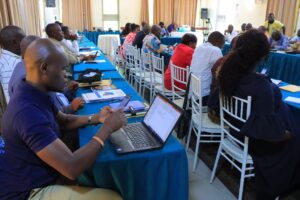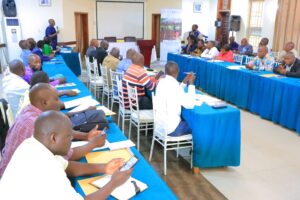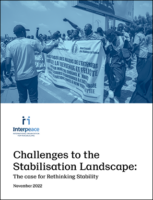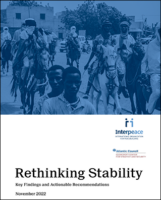The Democratic Republic of Congo (DRC) has taken a proactive approach to support communities in the eastern part of the country that has been affected by armed violence, through the formation of Mediation Advisory Groups (MAGs) in the provinces of Ituri and Greater North Kivu. These groups consist of approximately 50 actors who engage in mediation to prevent or resolve various conflicts, including land disputes, power struggles, administrative boundary conflicts, and those related to natural resources exploitation and armed group activities.
The MAGs are peace facilitators that bring together members of public institutions and civil society, including women's and youth associations. The initiative, funded by the European Union, is led by the Consortium, comprising Interpeace, the Pole Institute, Action for Peace and Concord (APC), and the Centre for International Cooperation of New York University. These platforms are used for dialogue sessions and to implement action plans that promote intra- and inter-community reconciliation.
The MAGs are an important step towards sustainable peace and development in the DRC's eastern region, and a crucial part of their internal structuring and capacity building. Members have been trained in conflict transformation, negotiation, and mediation techniques. The training has been extended to other mediation actors in Ituri, including land administration animators, customary chiefs, female association delegates, and representatives of youth structures.
During the establishment of the MAG in the Beni territory in January 2023, the representative of the province governor, Gédéon Kasereka, praised its inclusive nature and emphasised its sustainability.
"North Kivu is interested in establishing a legal working group, as it is essential to have a solid legal foundation. The group must also be legitimate, consisting of individuals who hold significant influence in society. Additionally, inclusivity is crucial, with accreditation extended to all members of the community, including women, men and the youth. Finally, sustainability is key, as the group should not be tied to any specific project,” he said.
This project aims to create sustainable peace in the region by bringing different communities together. The involvement of the MAGs is essential to achieving this goal. “The project's activities must continue to ensure lasting peace in the region.” As Christian Vingazi, programme manager at Interpeace, said during the January discussion held in Bunia, "We should not allow Ituri and its people to perish. We have already lost a lot. Let us take action to preserve this region and its people and set an example for others to follow.”
The MAGs are a real approach to helping communities in the DRC's eastern region reconcile and strengthen social cohesion. By working together, they can contribute to the improvement of trust between communities and help build lasting peace in the country.
André Kataloho, the chief of Bahema South Sector, believes that the MAG's involvement is crucial for ensuring the sustainability of project actions. "We would like these activities to be continuous in order to sustain peace actions within our entities. Whether in the Walendu Bindi chieftaincy or the Bahema South sector. The involvement of the MAG is necessary so that the two conflicting parties come together to walk in the same direction."
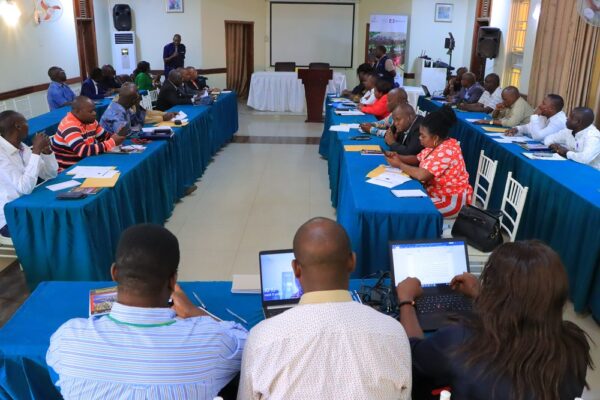
"In our commune, people no longer go to the courts. When there are conflicts, dozo hunters are called in to settle them; they are in great demand. They come without trying to understand (the issues) and they don't even know the procedures for managing conflicts. They commit a lot of injustice because all the denunciations are not always well founded.” -Young resident in Niono
Access to justice and the legitimacy of the justice sector in Mali has been a concern for communities for decades. In a country where formal justice mechanisms have always operated alongside traditional forms of justice, which communities have trusted the latter more, new types of actors are offering alternatives to formal and traditional justice mechanisms.
The weakening of the state, its security coverage and the provision of basic social needs is correlated with the emergence of other actors, inclined to carry out their own forms of justice and challenge the authority of the formal justice system. These contribute to catalysing a cycle of violence and revenge, as well as greater distrust of the formal state mechanisms from the population.
In the face of these threats, Malians require greater support and guidance from the judicial system to ensure that their rights are respected, to counter the rise of ideologies promoted by armed groups, as well as to guarantee transparent and fair treatment. The magnitude of these challenges calls for a holistic response that goes beyond the strictly security framework to encompass the aspects of governance, development and social cohesion that underpin people's relationship with justice.
It is in this context that the Institut Malien de Recherche-Action pour la Paix (IMRAP), with the support of its partner Interpeace, produced a participatory barometer to better understand and analyse the perceptions of Malian citizens on the challenges of access to justice, the causes of impunity and possible solutions to address them in an inclusive and sustainable manner.
Misunderstanding, corruption and lack of resources as roots of mistrust
The participatory barometer collected the perceptions and experiences of more than 2,000 people in 6 cercles in Central Mali: Mopti, Bandiagara, Djenne, San, Ségou and Niono. Respondents included community members, traditional authorities and justice actors, all of whom were represented and involved in the creation of the indicators, survey, and data analysis.
Results from the barometer showed that a major obstacle in the population’s access to justice is caused by misunderstanding and mistrust of the judicial system. Many participants were unaware of the channels and services they have access to, where four out of ten people said that they did not know where the nearest court was in their locality. The lack of knowledge of rules and procedures has also led to the further misunderstanding, mistrust and even rejection of decisions in formal justice systems. In addition, the use of French as the primary language in justice procedures and legal contexts, while almost half of the respondents either have not gone to school or understand the language well was an additional hurdle in accessing such systems.
In a region highly prone to poverty, the costs of legal proceedings and the geographical distances involved deter many citizens from taking legal action. The consultations showed that the costs of initiating proceedings, the assistance of a lawyer and bailiffs, and the deposits required (particularly in civil cases) made justice financially inaccessible to a large proportion of the target communities. This observation generates frustration among some participants, and fuels the perception of an unequal and two-tiered justice system.
In order to help litigants bear the costs of proceedings, the State adopted a law on legal aid in 2001 to facilitate access to justice for the poor. In practice, however, the interviews pointed to a limited application of these measures, due to a lack of financial resources and the difficulty of recruiting legal assistants who can provide the necessary help to people involved in proceedings.
In addition, the barometer also shows that suspicions of corruption and interference that put into question the legitimacy of the formal justice system. More than seven out of 10 respondents stated that the rich and the poor are not treated the same in legal proceedings and find that those with more resources are likely to get more favourable decisions.
The consultations also revealed the dissatisfaction of part of the population with the slowness and failure to complete judicial investigations, which fosters impunity and discourages people from filing complaints. Nearly one person in two surveyed by the barometer declares that they have little or no confidence in the resolution of their problems by the formal justice system.
Several magistrates also acknowledged that suspects sometimes escape justice because procedures are not carried out within the time limits set by law. They attribute this dysfunction largely to the lack of material and human resources available to the courts and investigation units.
“New actors”, instability, and the role of women and traditional authorities
For 60% of Malians surveyed insecurity is a major contributor to the increase in impunity in their locality, and three out of ten people cite it as the major obstacle to the application of the law.
Targeted by armed groups, many magistrates and court staff have retreated to Mopti, Ségou and Bamako, leaving behind slow-moving courts and insufficient resources to meet the needs and demands for justice of the population. In a region where 72% of civil servants surveyed said they feared being assaulted, kidnapped or killed while on their daily rounds, insecurity also prevents investigative units from going into the field to investigate crimes.
The withdrawal of civil servants and defence and security forces targeted by the violence has contributed in recent years to the appearance of 'new actors' in the provision of security and the settlement of disputes in the Centre. Faced with the gradual withdrawal of basic social services (security, justice, education, health, etc.) to the regional capitals, the population is increasingly turning to traditional authorities and 'new actors' such as dozo hunters, armed self-defence groups and so-called radical groups, depending on the area.
Faced with the rise in insecurity and growing number of new actors, the research has also shown that traditional conflict mechanisms play a key role in complementing the formal justice systems. Traditional mechanisms use customs, dialogue and religious texts to settle disputes, appease victims and find agreements between the different parties. They benefit from a certain trust and legitimacy among their communities, who call on them to arbitrate disputes and manage family, land and cohabitation conflicts. Seven out of ten people say that they first turn to the village chief to lodge a complaint or obtain information.
Consultations revealed a strong demand for collaboration and mutual reinforcement between the courts and traditional mechanisms to improve the delivery of justice and combat impunity. Those surveyed recognise existing efforts but express the need to expand and institutionalise a frank, structured collaboration that defines the competences and limits of both systems. This better complementarity can, according to them, contribute to relieving congestion in the courts and tribunals, and to a better understanding and recognition of the formal system by the traditional authorities and the population.
The barometer also highlighted the difficulties of access to justice, particularly for women. In the region, women generally have a lower level of education, financial means and less autonomy than men when it comes to the expenses and needs involved in legal proceedings. There is strong socio-cultural pressure to normalise certain discriminatory and violent practices against women and to dissuade them from initiating or pursuing legal proceedings.
The fear of being stigmatised and rejected by the spouse or family, the lack of information about the procedures, and the lack of money, support and time to follow through with the action therefore deter many women from using the institutions to defend themselves and have their rights respected.
Further strengthening trust in justice systems in Central Mali
The creation and research process of the participatory barometer, which started in 2021, has already provided an opportunity to increase awareness and foster trust between communities and justice actors in the 6 cercles.
However, the obstacles highlighted by the barometer call for further action in order to strengthen the justice system in the region. The findings of the research will be used to inform further interventions, engagement with the formal justice actors, as well as traditional authorities and policymakers in the region.
“The barometer, through an assessment of the perception of population from the middle belt regions on justice issues, aims to establish a better understanding around the challenges, realities and opportunities for an improved judiciary system and process,” said Kadiatou Keita, Interpeace Mali Representative. “The recommendations resulting from this process would increase the population’s understanding of the judiciary systems, and would further strengthen the frameworks for dialogue between population, traditional authorities and judiciary actors to eventually combat impunity and restore trust between the different actors. This trust is crucial in restoring lasting peace.”
Interpeace and IMRAP would like to thank the Office of the United Nations High Commissioner for Human Rights, the United Nations Entity for Gender Equality and Empowerment of Women (UN Women), and the United Nations Development Programme (UNDP) with the financial support of the UN Secretary-General’s Peacebuilding Fund (PBF), for their unwavering support for this initiative.
Access all results of the participatory barometer here: https://mali.elva.org/
Read the key findings and recommendations report (in French):
In Rwanda, a country that has experienced immense trauma following the 1994 Genocide against the Tutsi, community-based healing spaces are providing a safe and conducive environment for individuals to strengthen their mental resilience. These spaces help to create a culture of understanding and acceptance, allowing people to share their stories and find solace in the collective healing experience. Evariste Buregeya, 49, a resident of Bugesera District in Eastern Rwanda, like many others, has been striving to overcome the trauma he experienced in 1994.
In a family of nine, only Evariste, his young brother and sister survived the atrocities of the Genocide. This was the catalyst for a life of misery and despair, plunging him into a deep state of trauma and depression. He lost all interest in studying or working, as he had no hope for the future. At the age of 49, he remained unmarried, haunted by the fear that the Genocide could happen again, and his new family would be massacred.
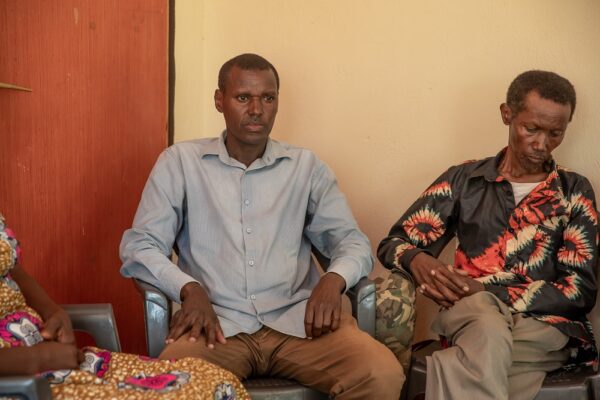
Mental health issues remain a major obstacle to mental, social, and economic resilience for a considerable part of the Rwandan population, as well as to the cohesion and reconciliation of the community, according to several studies conducted by Rwanda government institutions such as the Ministry of Health (RBC 2018) and the former National Unity & Reconciliation Commission (Rwanda Reconciliation Baromoter- 2020) among others.
Evariste regained hope after joining a Resilience-oriented therapy healing space created by Interpeace through its partner, Groupe des Anciens Etudiants et Elèves Rescapés du Genocide (GAERG), as part of its Societal Trauma Healing Programme in Rwanda, funded by the European Union and the Government of Sweden through the Swedish International Development Cooperation Agency (Sida). The Resilience-oriented therapy is a multi-phase group-based treatment that focuses on emotion regulation to address anxiety or depression, behavioral self-management to tackle substance abuse or aggression, and identity development to address chronic emptiness or alienation. It was introduced in Rwanda in 2020 by Interpeace in close collaboration with the Ministry of Health’s specialised agency, Rwanda Biomedical Center (RBC) to provide psychosocial support to those struggling with psychological distress and strengthen their mental resilience. By joining this healing space, Evariste was able to find hope and a renewed sense of purpose.
After attending the Resilience-oriented healing space for a period of three months along with nine other people from his neighborhood who were facing the same challenges, Evariste recognised that the therapy had positively changed his life. “I no longer feel depressed; my suicidal thoughts have gone, and I have regained my smile,” he narrates, adding that “My fear for a potential Genocide is no more. My plan is to get married soon and start a beautiful family.”
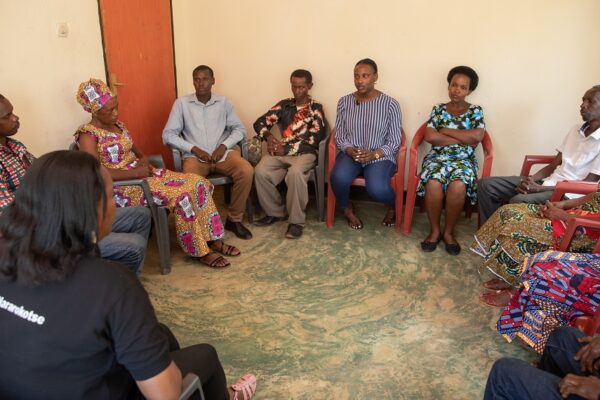

The 10 group members who attended the resilience-oriented healing space were identified during a screening process performed prior to the start of the space. It is through this scientific and rigorous screening process that Interpeace and its partners identify and assess individuals' needs and level of distress, before allocating them to appropriate intervention groups.
Facilitated by well-trained psychologists, Resilience-oriented healing spaces create a conducive environment for participants to share their traumatic experiences, stories and daily challenges and empower them to support and help each other in the healing process.
Evariste’s story is not isolated. The 2018 Rwanda Mental Health Survey (RMHS) conducted by the Rwanda Biomedical Centre (RBC) revealed that the prevalence of various mental disorders in Rwanda is higher than the global average, particularly among genocide survivors. Poor mental health has a detrimental effect on their social and economic wellbeing.
The Mental Health Survey revealed that only 5% of Rwandans suffering from mental health issues seek medical help, partially because of the cultural stigma associated with one-on-one therapy and the overwhelming demand for mental health services that exceeds the capacity of available professionals.
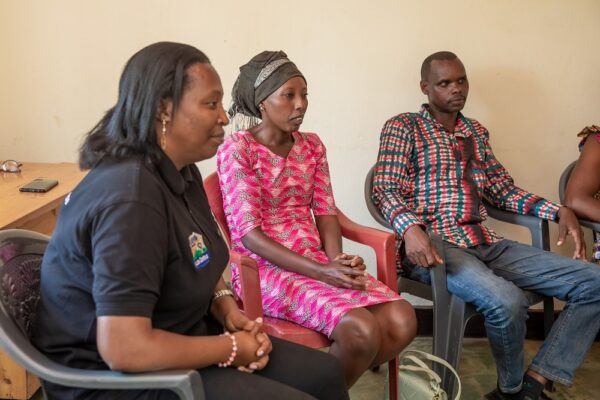

Dr. Yvone Kayiteshonga, RBC’s Mental Health Division Manager, appreciates the impact of resilience-oriented therapy in addressing the challenges faced. “The community-based and group-based approaches that Interpeace uses to improve the mental wellbeing of individuals are adapted to the realities of the context, given the large number of Rwandans who need treatment. These approaches are promising and have demonstrated that individuals who have experienced trauma can heal and regain trust and hope for a brighter future.” Notes Dr. Kayiteshonga.
The programme supports the government’s efforts to build a decentralized national mental health system by strengthening infrastructure, developing the capacities of local professionals, and building a mental health and psychosocial support services coordination network at local level. It also provides equipment such as the Mobile Mental Health Clinic that enables professionals to access remote communities and provide home-based care.
Media professionals in Kasai have taken a major step towards promoting peace in the Democratic Republic of Congo (DRC) by establishing a committee to reduce violent conflict caused by biased reporting during elections. On 28 January, the Action pour la paix et la concorde (APC) and Interpeace held a two-day workshop in Tshikapa to discuss conflict sensitive reporting. This initiative is part of a larger project to strengthen inclusive governance and peace in the DRC, particularly in the province of Kasai, which has been underway since 2021 in collaboration with the provincial government. The committee seeks to raise awareness of the potential consequences of irresponsible journalism and encourage the media to take a more responsible approach to reporting during election periods.
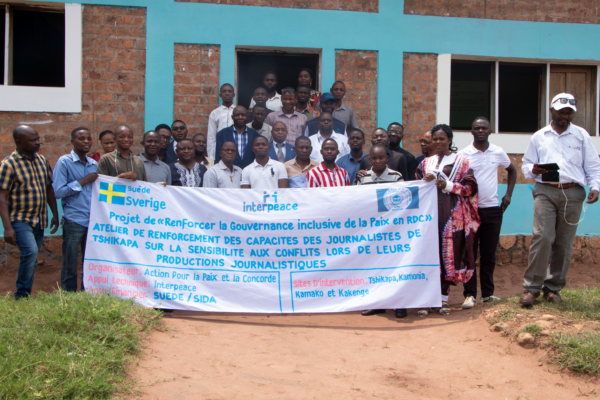
At the opening of the workshop, the provincial Minister of Transport, Ditunga Beya, who was representing the Governor, urged journalists to engage in unbiased reporting.
According to the Provincial Minister of Transport, “the workshop offers a chance to request journalists and political actors with platforms on various local radio channels to help the Congolese people assess their political leaders in a peaceful and harmonious environment.”
Funded by the Swedish Agency for International Development (SIDA), the Kasai programme seeks to engage political, administrative, and customary authorities in Kamonia, Kamako, Kakenge, and Tshikapa in the process of peaceful conflict resolution. Simultaneously, the programme is taking the initial steps to establish foundations of peaceful governance in DRC by facilitating dialogue and mediation for reconciliation, as well as social cohesion among the local communities, the authorities, and the security forces.
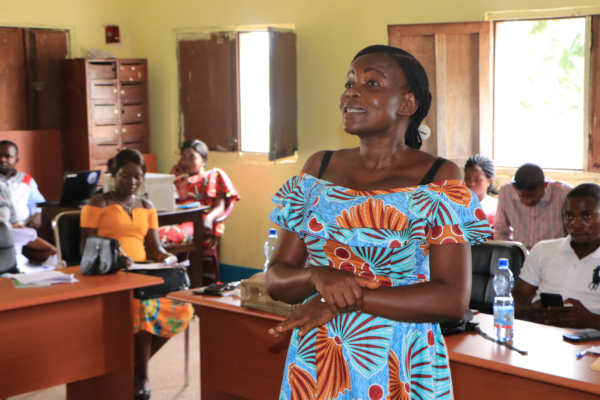
The city of Tshikapa, the capital of Kasai Province, was established in the Democratic Republic of Congo's Constitution of 2006 and materialised in 2015 with the dismemberment of the provinces. With over 15 community radio stations owned by various national, provincial, and local political actors, these radio stations often find themselves embroiled in controversy due to their biased reporting in favour of their owners. Consequently, some actors have criticised the role these local radio stations play in intensifying violent and intercommunity conflicts. The establishment of the media professions committee will enable journalists broadcasting on local channels and hosting programs to raise awareness of peace among the population. The committee aims to engage political actors and policymakers without distinction based on gender or political affiliations.
The committee is chaired by Bethy Mukubayi of Voix de votre communauté (VVC) Radio, and is supported by Celestin Kadiandanda of Télé Entrinel Radio and Diaris Kindalo of Ondes du Progrès Radio in the secretariat. Diaris will be responsible for monitoring the committee's media professionals on social media.
The workshop was a cause for celebration among the journalists in the city of Tshikapa, who perceived the establishment of the committee as timely. They expressed the desire that the committee’s mandate to be extended to all the territories of the Kasai province and, if possible, to the entire nation.
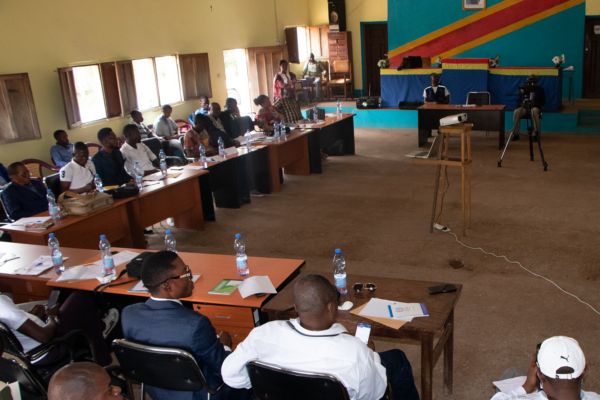
“Stabilisation” has become a major part of the international toolbox in conflict affected areas. Despite their stated purpose of reducing violence and laying the structural foundations for longer-term security, these efforts have too often not only failed, but on occasion made conflict worse.
In response, Interpeace in partnership with Atlantic Council, led a two-year initiative called Rethinking Stability with the support of the Bundesakademie für Sicherheitspolitik (BAKS) and the financial support of the Governments of Germany, Netherlands, Sweden and Switzerland. Through five dialogues on three continents, in-depth research, and discussions with over 1000 policymakers, academics, practitioners, and citizens experiencing stabilisation initiatives, the project aimed to revisit and question the conceptual and operational norms behind stabilisation efforts and improve the prospect of future work contributing to lasting peace.
The initiative culminated in two reports: the first, Challenges to the Stabilisation Landscape: The case for Rethinking Stability, describes the specific challenges that have hindered stabilisation efforts; and the second Recommendations paper, suggests operational ways to address them.
Key challenges & Lessons Learned
The experiences of twenty years of stabilisation interventions in Iraq, Mali, DRC, Afghanistan, Libya and elsewhere will significantly shape future efforts. To meaningfully rethink, redo and improve the ways in which stabilisation activities are conducted, it is critical to draw the correct lessons from these experiences.
At present, ambiguity around what ‘stabilisation’ is and how it is done has led to competing priorities among security, humanitarian, development, and peacebuilding actors. This has made it difficult to develop a clear strategic vision of success around which actors can orientate their different strands of work, resulting in poorer peace outcomes for conflict affected populations.
Compounding this definitional and strategic ambiguity has limited conflict analysis. Working from incomplete conflict analyses has seen stabilisation efforts stall, or else operate in conflict insensitive ways. As such, efforts have listed and lingered, with little success in transforming the social and political drivers of conflict that would permit a safe exit strategy.
Moreover, people affected by conflict have rarely been given sufficient opportunities to design the stabilisation activities that shape their lives. In pursuit of ‘returning the state,’ stabilisation efforts tend to get stuck at the elite level in capital cities, hindering a much more inclusive process that impedes broader national input, ownership and support. This continues despite clear evidence that overly focusing on the central government, securitising one set of elites, and turning national capitals into fortresses, is no recipe for stability. Exploitative elites, corrupt bureaucracies, and captured or poorly functioning institutions have all been propped up in the interests of immediate stability, only to emerge later as significant obstacles to reform and new sources of popular grievance. This version of ‘stability’ can only be sustained by continued international military support, and is far removed from the inclusive, self-sustaining stability that people living in conflict affected areas require.
Indeed, securitised responses alone are unfit to meet what are really political, social, and economic drivers of instability. These need to be addressed through multi-disciplinary and integrated approaches able to complement each other. This has serious implications for staff recruitment, retention, and incentivisation, not to mention where funding is directed and to what end.
Learning and adaptation is difficult in unstable areas. Movement can be limited as can access to reliable data, whilst contexts can change quickly. However, resources must be apportioned to make evaluation and learning a critical component of every stabilisation programme despite these challenges. Otherwise it is verging on impossible to know whether progress is being made and where to adapt and improve. Beyond resources and capacity, the culture of stabilisation may need to shift. Stabilisation is very difficult work with setbacks highly likely. However, there is evidence that on occasion there has been pressure for staff to demonstrate success when, in fact, efforts have not been going to plan at all. All actors will need to arrest this trend and foster a culture of honesty, reflection and support. Only then can failures become learning moments rather than missed opportunities to improve.
The first paper dives deeper into these and other challenges and begins to show how more inclusive political strategies, principled approaches and realistic timelines may generate better stabilisation outcomes for people.
Actionable Recommendations
For those working on stabilisation who will have to grapple with these issues in the near future, the answers cannot be framed around the same logic of securitisation that has defined the past. Instead, the challenge will be to describe, with much more clarity, how stabilisation activities will contribute to the development of genuinely inclusive political processes able to improve governance, and construct systems, networks and institutions necessary to recognise and respond to the real grievances behind people’s instability.
To that end, and although stabilisation is understood in different ways, actors appear to agree on three central tenets around which more integrated and principled work could be designed:
- Stabilisation activities should improve the stability and peace of communities in active armed conflicts.
- It is fundamentally a political process and cannot be attained by security arrangements alone.
- It should be temporary and transitional, designed to achieve the peace conditions required for legitimate stability, so that international actors can move away from security and other functions that should be the preserve of host governments.
Peace conditions are changes that conflict affected populations themselves deem necessary for durable peace and stability. Introducing it marks an important reframing of what achieving genuine stability entails. Peace conditions are put in the center of the recommendations paper, which refocuses stabilisation work on collectively understanding and responding to the political and social drivers of instability in each context. The paper makes 30 recommendations, divided across Strategic Planning, Operations, and Learning & Adaptation. Three key recommendations include:
- Ensure stabilisation efforts are locally and nationally owned by defining peace conditions jointly with key stakeholders. These can offer a strategic framework to guide action and measure progress, and a shared agenda for the humanitarian-development-peace nexus, promoting the right action by the right actor at the right moment.
- Plan exits and encourage inclusive political transitions from the start. Plans will change over time, but decisions on when and how to exit and transition should not be tied to temporal deadlines or international political whims, but based on progress towards the achievement of peace conditions indicating it is safe to do so.
- Design theories of change that are rooted in political economy analysis and describe how activities will solve the real problems driving instability. Theories should not privilege state authority discourses, but improve trust, resilience, and the social contracts at the core of positive peace. This approach is likely to require more support for hybrid governance solutions, and a stronger focus on resilience and prevention.
Realising peace conditions will certainly require smarter policies, practices, and resources used, and some of the recommendations address this. However, as a field, the larger challenge will be to change our stabilisation habits and processes that have brought us to where we are. Some may find this aspiration, and perhaps the very notion of peace conditions, naïve. Yet, as current stabilisation efforts stall, any serious effort of Rethinking Stability obliges us to decide what we need to improve both as individuals and institutions to make sure that future efforts are a wholesale improvement on how we currently operate. We hope these recommendations can support that process of introspection and change, and refocus future efforts on what has too often been a secondary consideration: achieving inclusive and sustainable peace for people living in conflict affected environments.
